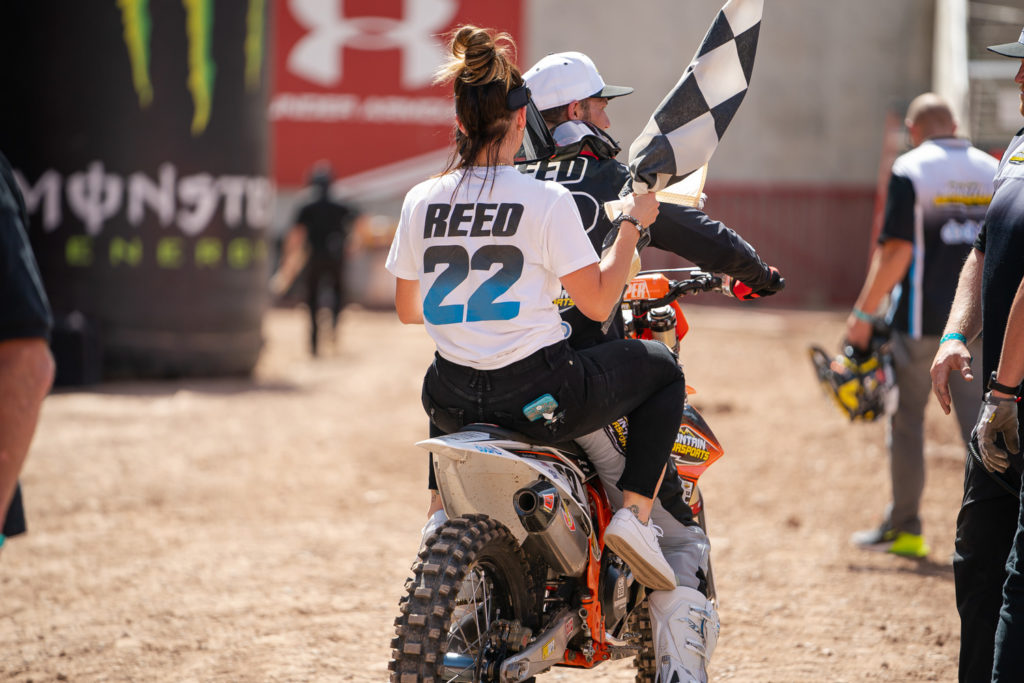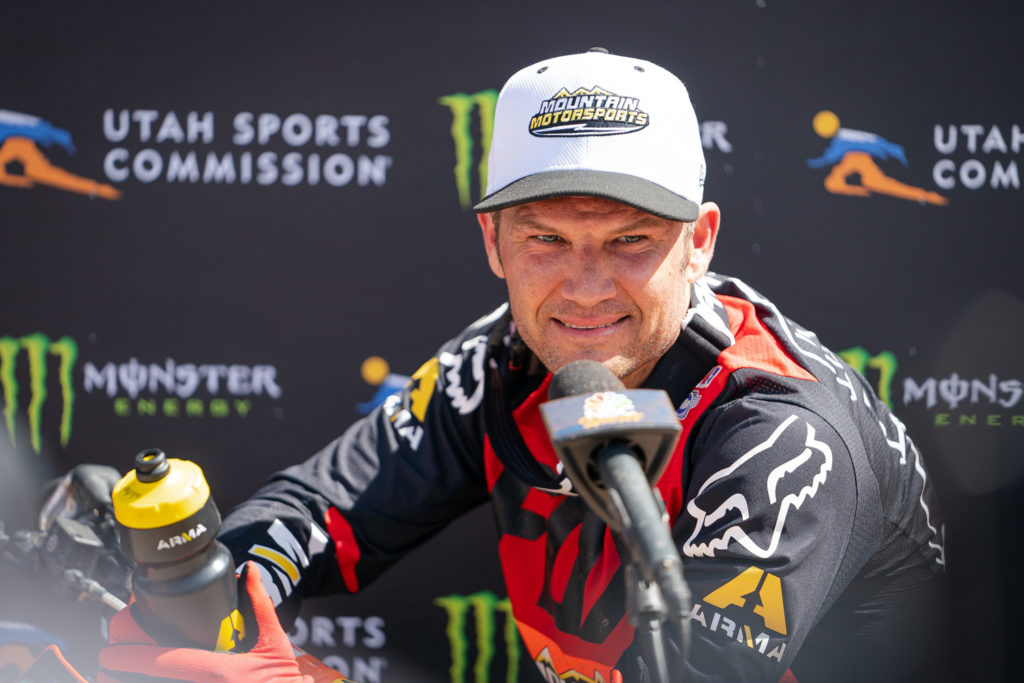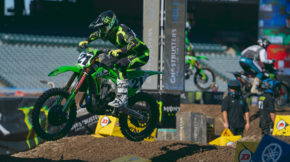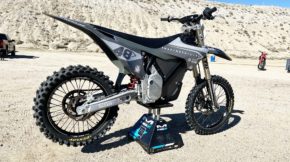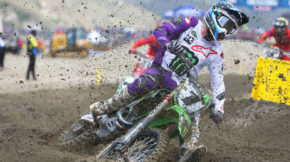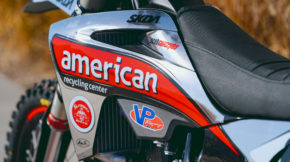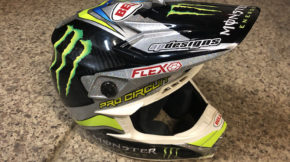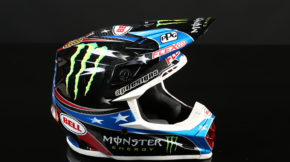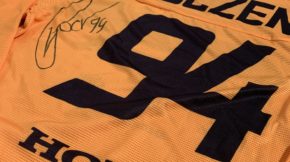Chad Reed | CR22’s Last Dance
Share
You could tell that Chad Reed was at ease when the “One Last Ride” Press Conference started. The two-time champion was the center of attention for the Moto Media, just like he’s been since joining the US SX scene in 2002, but the setting was far different than anything else he experienced over the course of his two-decade pro career. There was no stage, no lights, no shutter clickers from photographers, or Monster Energy model to shuttle a microphone around an interview room. Instead, Reed was alone in a room with his smartphone connected to a Zoom meeting, seated next to a window that overlooked the mountains of Park City, and miles removed from the people that asked the questions.
The absence of an in-person audience wasn’t the cause of Reed’s laidback attitude, as his history of unfiltered answers and quick retorts to questions he didn’t like proved that no one with a press pass could intimidate or paint him into a corner (I personally had caught his ire during an Anaheim One pre-race press conference, a clip of which was later used by one of KTLA’s morning news shows). Reed’s ability to turn a bad question into a soundbite is unrivaled, but that wasn’t going to be necessary this time. Instead, the assembled media shared memories of Reed’s career, asked about key moments in past races, how he felt just a few days away from his final gate drop as a full-time Supercross competitor, and if we’d see him in the near future.
Supercross commentator and press conference host Daniel Blair wasted no time when it came to asking Reed if this really was the end, a question that many of us on the call had discussed within our own groups in the weeks leading up to the race. “I never trusted myself. It was always this is an end of a full-time racing career. I no longer have that burning desire to want to work year-round to do a 17 round series anymore,” Reed said. “But yeah, jumping in and doing some races whether that’s here in the US or on Europe, Australia, whatever. Then obviously, with the ending that we’re currently experiencing, it’s far from what I pictured as my last seven races.” The move to Salt Lake City for a seven-race run without the public in attendance was never expected for the One Last Ride tour. Without the fans in the stands, the fireworks of opening ceremonies, or an AC/DC song playing over the stadium sound system, the CR22 experience in Utah was a shell of what it was supposed to be, but with bigger problems going on in the world, Reed knew this was not the right thing to complain about. “That doesn’t need to be a negative. It’s not that I’m talking that these races suck or anything like that. It’s just a very different feeling,” he shared. “I decided to race this year, fully based on the fact that I wanted to say my goodbyes and enjoy multiple stadiums around the country. I didn’t get that opportunity. We’re really six stadiums short of what I originally had planned out to do.”
Ricky Carmichael, one of Reed’s biggest rivals that became a close friend after his own retirement, steered clear of reliving their old races and instead praised Reed for his accomplishments, which included the short but successful TwoTwo Motorsports. A pivotal point in Reed’s career, the role as Team Owner allowed complete control over every detail of the bike, something the rider relished when compared to the rigid structure of the factory teams, and Carmichael asked if Reed would ever take a Management position for one of the Big Six race teams. “I would love the position and I think that Roger De Coster, if I was to put effort and to go and do something, I’d want to be Roger. Because it’s so hard being and seeing what I’ve seen and know what I know and running my own race team and seeing what makes a team successful and what makes a team fail,” Reed explained. “I think that you have to be in the position of a Roger to be the guy that if you make bad choices you fail and then if you make good choices, you win. Anything in between that line is probably where I struggle the most with every individual in our sport.”
Although it’s a career path that Reed hasn’t even started to go down, he went on to say that he’d do it only if the situation met his standards and that there is one team he’d like to help change. “Give you the resources and give you the reins to be successful. Don’t give you just enough reins to hang yourself. Give you enough to go out and get the job done. It’s always hard to talk about this while you’re still racing, but never really shied away. But I think that Yamaha probably needs my help the most,” he noted of the Blu Cru, the brand he spent a major part of his career with. “It’s near and dear to my heart. I have a lot of successful years. The years that you look back on and think man, they were the cool years, they were fun. I was riding blue. To see them at the level that they’re at now is less than the highest level in my opinion. A team like that would be fun. But with saying that, you want to be involved in a company that’s thriving to build rad motorcycles. People that are producing motorcycles near the weight limit and pushing that envelope like KTM Husky are. Roger’s got himself a fun project.” Is a spot in the manager’s tower with a headset in Reed’s future? We’ll see someday.
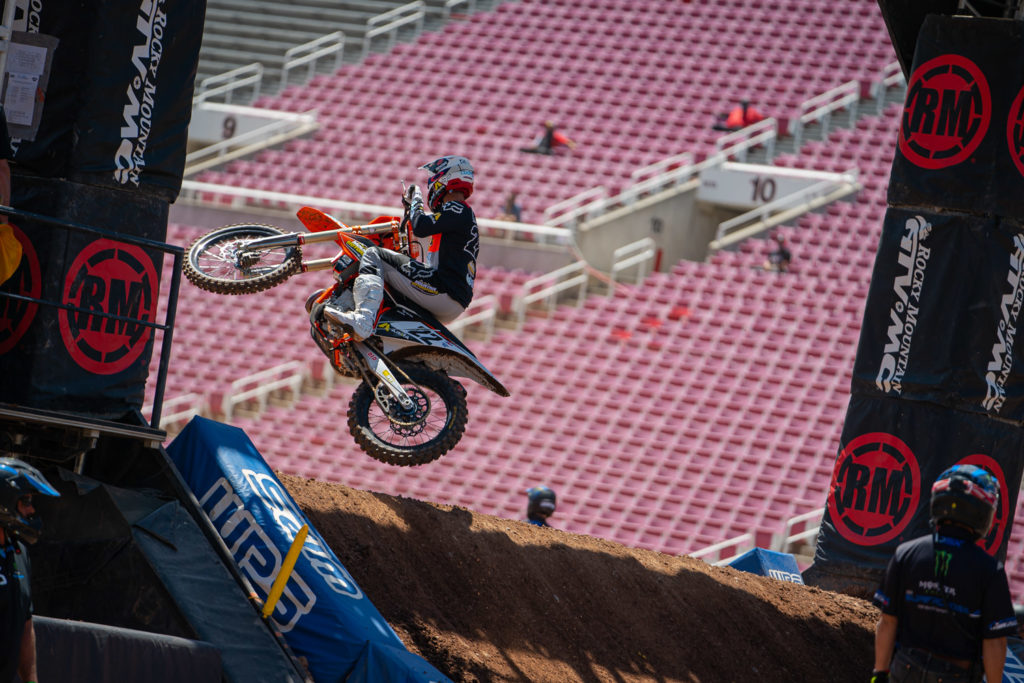
Reed’s tenacity has long been a topic of discussion, all because of the way he’d overcome injuries or issues in an attempt to be on the starting line. “It was always the fear of not racing and not being able to compete. There are so many times in my career I could say that it was ridiculous to try to swing a leg over a dirt bike. But the fact of sitting in the stands or sitting in my motor home always seemed way more painful than getting out and trying to race against the best dudes in the world,” he said before bringing up times when missing a race was not an option. “Before Daytona in 2006, I crashed heavily on a Thursday, I believe. It was a weird story, but I separated my shoulder, couldn’t move it. Went and got X rays. While they were doing X rays, they make you hold weights. While doing that, I passed out and knocked myself out. Then I woke up having to go get a CAT scan as well. Not only I got knocked out from not crashing, but from falling over in the hospital. Showing up a couple of days later with a concussion and a shoulder that I couldn’t even move and somehow I went and got second in the race, that was pretty damn cool.
“Detroit in 2008 like you said, I a pretty good grip on things as far as winning races, being on the podium. Had a pretty good handle of Kevin Windham and Davi Millsaps that year. Then essentially bike bogging and then just coughing up a ridiculous amount of blood. I’ve never seen so much blood come from my mouth before. I was scared,” he admitted. “Back in those days when manufacturers had a little bit more power, Windham’s camp and Honda were able to force a physical. I had to pass a certain physical for me to race that night. I had to get up and out of bed and check myself out of the hospital, still showed up in opening ceremonies with the wristband. I think I got 12th that night or something like that. I was in a lot of pain.”
He went on to explain that this was something he’d done his whole life, dating back to his time as an up and coming talent in Australia. “I grew up in a town called Newcastle and there was a Supercross in Newcastle. I went out and broke my wrist in practice. Friends, family, your schoolmates are all going to be there. Back in Australia, we got to race Supercross from when we were 12 years old and go and race with the pros,” he noted of the early 90s. “Basically, I didn’t really want to go to the hospital and I didn’t really want to let on to dad that I was hurt because dad would have lost his mind. I just basically just said, ‘Hey, Mom, I think we’re going to tape this thing up, I got a bit of a sore wrist.’ Raced the race, woke up the next morning couldn’t move my wrist. Mom had to take me and I got a cast on my wrist. I won the race. Things like that. I went pro at 15. I was living by myself in New Zealand. Fell over, broke my collarbone. I was too scared to call my mom and dad to tell them that I broke my collarbone. Basically, I took a week and a half, two weeks off, and just started riding and racing back in two weeks. It’s one of those things that I was always just too afraid to be off the bike, or basically confront people like my mom and dad, and now Ellie.”
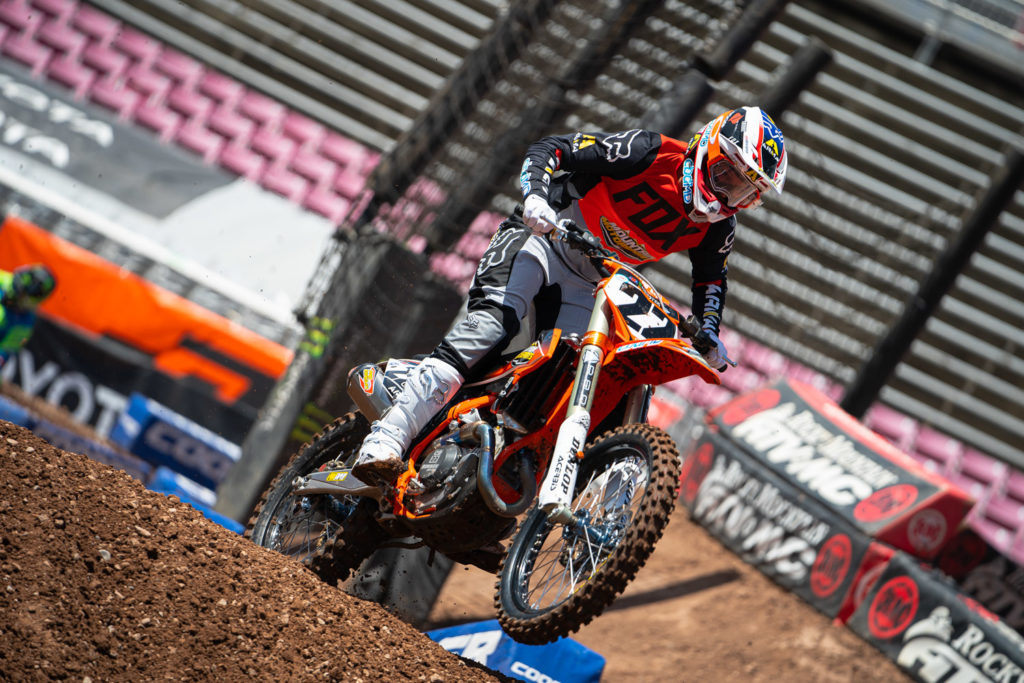
How Reed arrived in the United States with virtually no hype and became a superstar is incredible, something he attributed to following in the footsteps of his own hero, Jeremy McGrath. That his debut came just as MC’s career tailed off was as close to perfect as possible, because he then became the challenger to new champion Carmichael. “I basically loved Jeremy and replicated Jeremy. Fortunately for me, there was this young punk, Ricky Carmichael, who came and stole the crown from the king. People loved to hate him. They needed somebody else to love because Jeremy was on his way out and I inherited Jeremy’s side of the fence,” Reed shared with a laugh. “I was really fortunate fans were always on my side early in those years. The Pastrana days of running into Ricky and all that, just really feel everything in my favor. Of course, I may or may not have played off of that a little bit and had a bit fun with it. They were the good times, for sure. They were fun.”
This isn’t the first time that Reed has contemplated retirement, as he said that Carmichael’s decision to stop racing in 2007 made him stop and reassess why he still wanted to do it in his late 20s. “2007 was probably the closest that I ever came to being like,’ I’ve had enough.’ At that point, it was a weird moment because Ricky had retired. A big part of my motivation and that work ethic came from racing a guy like Ricky. When that was gone, I had to find new motivation. Yeah, James was there, but it was different. Back in those days, I was quite popular in Australia. I did a V8 supercar test with Triple Eight. I really enjoyed that. I’m like, okay, maybe this is my new route. But when it came to fulfilling and saying, all right, I’m quitting, I’m retiring. I just could never do it. This is the first time that I felt that I could do it is you heard it from my mouth in Australia (at the AUS-X Open in November 2019).”
Part of the reason Reed is ready to stop SX is that he’s found a similar feeling behind the wheel of a four-wheeled race car, something that came together through his friend and Mountain Motorsports co-founder Justin Price. “I started doing some car racing last year. My thoughts at night, my mind was consumed by something completely different. For me, that was the sign. It literally happened overnight, and that was it,” he said. Reed’s 2020 plans included a place on the grid in the Lamborghini Super Trofeo series, an international championship that’s been halted due to the virus.
Staying around as long as he has given Reed a unique opportunity to race a generation of riders that watched, and maybe even idolized him, during their minibike days. The new crop of talent has always shown their respect and with his time winding down, many took the moments before motos as a chance to bench race and share memories. “Jason Anderson would tell me that he used to wear my replica goggles and things like that. Some of the stories like from a guy like Chase Sexton, the stories they have are from ’06 and ’07, which is midway through and those guys are just only babies at that point,” he said with a laugh. “It’s been interesting to interact with them, to hear their stories of how it used to be and how they viewed it on television at a young age. Now you’re getting to race with them. It’s hard to put that into words, because it feels so surreal. Because I don’t go, ‘I’ve been around forever. I feel like I’m 40 years old, almost.’ I just think I’m one of the boys, but I’m a little more seasoned.”
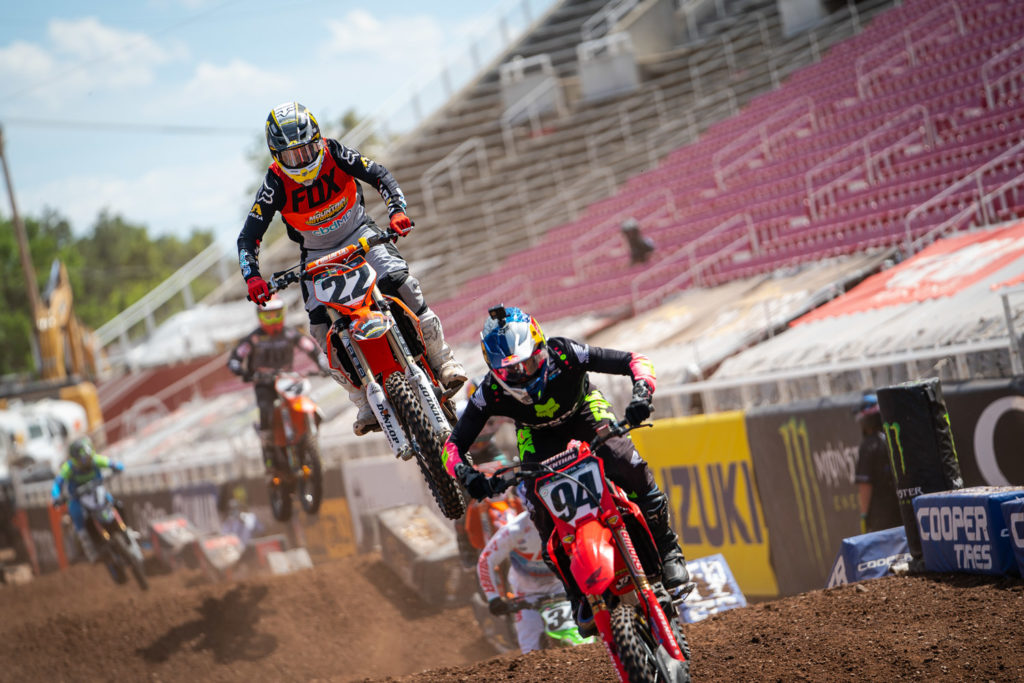
With titles, wins, and an indelible mark on the sport, Reed will be in the Hall of Fame sooner than later. As important as the accomplishments are, Reed feels fans will remember him more the way he went about things and the era he competed in than they will checkered flags. “The one thing that I would like to be remembered as just a guy that did it his own way. It may not have from the outside looking in, might not have looked like the right way or the correct way or the best way. But every decision I made was the decision that was best for me at the time. I stuck by that,” he noted. “There have been teams I love, there have been teams I didn’t really love. I’ve been critical of people and personnel and the influence that they have. I put my money where my mouth was, I ran my own team, we were successful. We almost won titles, running it, owning it, spending money, all those kinds of things. I would just say that that’s the only input I would have on it, just I always did it my way. It didn’t really matter. Nine times out of 10, whatever my agent told me, I would do the opposite because I didn’t believe in it. I just always did my own thing, really.”
“For me, it’s the era that I got to live. Growing up as a kid in Aussie, and then coming and racing here,” he explained is one of his proudest accomplishments. “I’m currently fourth on the all-time win list. Depending on how long Eli chooses to go, he may pass me. But what probably makes me most proud is when I came in, it was Ricky, then it was James, then it was the Ryans. Stopping the Ryans and James and Ricky, those dudes, they’re the greatest. They’re all, in their own minds some of the greatest that ever did this. For me, to win as many races as I have, to be able to sustain a career like I have, has really been the evolution of trying to learn from each individual along the way. Because they all have their strengths and weaknesses, and it’s that balance of figuring that out. I just always found so much desire, so much fun trying to conquer that and that’s probably been my greatest achievement is no matter the championships that I lost, who I lost them too ain’t no slouches.”
The Reed-Carmichael-Stewart timeline was one of the most intense times in the history of the sport. All three riders will openly state that they practically hated each other during the peak of their careers, but now that they’ve come to a new point in their lives, they’re able to remember it fondly. “At the end of the day, you’re doing it with the same outlook or the same outcome. Unfortunately, one of us can win. Ricky and I always had this respect for each other. Obviously, Ricky is older than me and was in it before I was. I think that I always looked up to him and always was a fan. James and I just really came in at the same time. I think it was just a little bit more personable, it was always going to last a little longer. Once they retire, it’s such a different feeling, because when I look back, though you dreaded the moment at the time, that’s the highlight reel that I play over in my own head when I think about the good times in my own personal career, the good times in the sport of Supercross, when it was thriving at its highest point. I think that that’s the point. I was a big part of it with those two. You shared something with two individuals that are, in their own right, the greatest athletes at the time. I just feel proud that I was a part of it.”
The wrap-up of the press conference meant that we were getting closer to Sunday’s race, and Reed took the last few moments to fully express his appreciation for racing, the life it’s given him, and the situation we all found ourselves in. “It’s a weird ending for all of us. I don’t think that I’m alone in this. I think that wrapping up a career, wrapping up a championship, there’s definitely got to be something that’s just a little surreal about this moment (in Salt Lake City) and it is what it is. I’m thankful that I get the opportunity to still go out and race. But definitely that pipe dream of coming back next year and doing a race or two or three, who knows? Maybe none,” he acknowledged. “I just love the sport. I love that we have some young kids coming up. I’ve had a blast. It went way too fast. It feels surreal. Like I said, I still feel like an athlete. I still feel like I think like one. It’s hard to think that that it’s all coming to an end. But when I think of it is coming to an end, it’s mixed emotions; it’s sad, it’s happy, it’s proud, it’s all the above.”
In true Chad Reed style, the 2020 Salt Lake City Seven Supercross proved to be his best ride of the season as he battled to an impressive tenth-place finish between Justin Hill and Aaron Plessinger, two riders that are a fraction of his age. While many looked at the result as a reason for Reed to continue on in 2021, as it validated his stance that he could remain a front-runner if able to put in a healthy and uninterrupted offseason of prep, his comments in the post-race interview indicated that the desire to race Supercross might truly be gone.
“It’s so hard to put into feelings,” he explained as he tried to overcome an audible lump in his throat. “The whole last couple of days have been steamrolling, like when you get text messages and social media stuff, it starts to hit home. When you start of a day with the track being muddy and nasty, this may be the last one. I don’t enjoy practice to the Main Event anymore, I just love racing the Main Event. That’s when it’s real.
“When you see the champ (Cooper Webb) and Ken Roczen in front of me struggling, I just was ticking away and putting laps together, and that was probably the best ride of my season. It’s Father’s Day, so maybe it’s time to be a good dad… I don’t know if I’ll be back or not, but this is a good way to end it if this is it.”
Moments after the interview wrapped, Reed’s wife Elli got on the back of the KTM 450 SX-F with the checkered flag in hand, a gift from the race officials that watched Reed’s career. Together the two rode out of the stadium, a fitting farewell…
